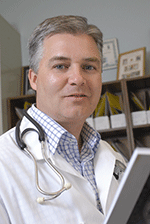2017 CSCC Webinar Lectureship on Cardiovascular Disease
Thursday January 26, 2017
0830 PT / 0930 MT / 1030 CT / 1130 ET / 1230 AT / 1300 NL
Sponsored by
The Role of Biomarkers in Patients Undergoing Non-cardiac Surgery

Speaker:
Dr. Philip Devereaux
Director of Cardiology, McMaster University
There is no charge to attend this lecture but it is necessary to register
Recent evidence demonstrates that brain natriuretic peptides (BNP) and N-terminal fragment of proBNP (NT-proBNP) strongly predict major perioperative cardiac complications after noncardiac surgery. Most myocardial infarctions occur within 48 hours of noncardiac surgery when patients are receiving analgesic medications, and this likely explains why 65% of patients suffering a perioperative myocardial infarction do not experience ischemic symptoms and without troponin monitoring would go undetected. Based on these data, the recent Canadian Cardiovascular Society Perioperative Guidelines have given the following strong recommendations: 1) measuring brain natriuretic peptide (BNP) or N-terminal fragment of proBNP (NT-proBNP) before surgery to enhance perioperative cardiac risk estimation in at-risk patients; and 2) measuring daily troponin measurements for 48 to 72 hours after surgery in at-risk patients.
At the conclusion of this session, participants will be able to:
1) understand the evidence behind the new recommendation to measure BNP or NT-proBNP before noncardiac surgery
2) understand the evidence behind the new recommendation to measure troponin after noncardiac surgery.












